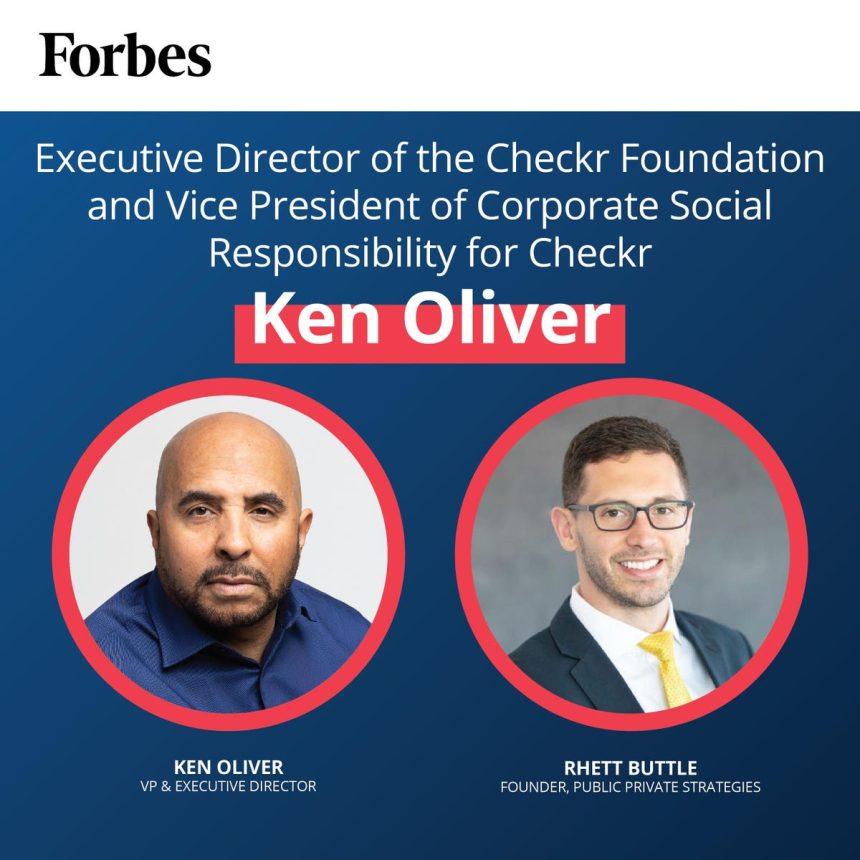By: Rhett Buttle
One of the greatest inequities exposed over the last three years is how people in underserved communities are also unfairly impacted by the justice system. This in turn makes it harder for them to find employment and only hurts our economy and Main Streets across the country.
Ken Oliver, Executive Director of the Checkr Foundation and Vice President of Corporate Social Responsibility for Checkr, has experienced this firsthand and is working to address it. After a lifetime sentence in prison, Ken Oliver returned home in 2019. As part of the fair chance hiring movement, Ken leads conversations with businesses nationwide to find ways to reincorporate individuals impacted by the justice system. Over the past four years, Ken has been on the frontlines of the movement, finding ways to address the “social death” that occurs after conviction of a misdemeanor or felony.
I recently spoke with Ken about his experience working to create an inclusive economy through fair chance practices including education, implementation, and practice. Below is our conversation, edited for clarity.
Rhett Buttle: Ken, you’re coming up on two years as a VP at Checkr and the Executive Director of the Checkr Foundation, the philanthropy arm of Checkr. What have you learned while being in this position and what should the business community know about the work that you’ve accomplished?
Ken Oliver: In order to talk about my position and what I’ve accomplished, I think it’s important to give some background about the amazing mission of Checkr. Checkr is a background check company, a seemingly counterintuitive company for me to work at given my background and lived experience with the justice system. Checkr started in 2014 as a background check company, but soon thereafter quickly realized that the background checks they were delivering to their customers were having a disparate impact on the justice impacted population, and specifically black and brown communities.
The founders wanted to embark upon a journey of how they could shift the narrative associated with conviction records by providing employment opportunities for justice impacted people, and in 2015 they began to do so. By 2021, almost 6% of Checkr employees were people who had suffered from some form of justice involvement so the company decided to formalize and operationalize their social impact mission by taking the 1% Pledge and separately creating the Checkr Foundation to support fair chance hiring initiatives, thought leadership, and advocacy across the country and so other businesses across America could model.
To Checkr’s credit, they hired me because they wanted a proximate leader in the space, someone who understood both the ins and the outs of operating a foundation, and someone who had the visibility of what it was like to be impacted by the justice system. They believed and understood that people who were closest to the problem could also provide the best solutions for it. So, they brought me on to lead as the Vice President of Corporate Social Responsibility and to also be the Executive Director of the Checkr Foundation.
The work that I’m most proud of is the work we get to do in corporate America, because those are the decision makers at the end of the day. I have the privilege to go and not only talk to Checkr’s 100,000 customers on a regular basis, but I also get a chance to talk to some of the biggest companies in America about how to institute change management that will support a broader, more robust version of fair chance hiring for the 80 million people who have records in this country. I get to have hundreds of conversations a year to change thousands of people’s hearts and minds, to reshape the narrative of what it means, and doesn’t mean, to have an arrest or conviction record in this country. We have designed and built a curriculum wherein we teach companies how to gather stakeholders in a company and how to build culture and company support to implement fair chance hiring practices.
Rhett Buttle: There are approximately 80 million people in the United States who have an arrest or conviction record. Tell us about the type of barriers that they face trying to obtain meaningful work.
Ken Oliver: A lot of the barriers that people face revolve around stigma and the mystification around perceived risk that people and businesses tend to think about when they hear about someone who has a conviction history. We’ve created laws and perceptions around this notion of civil death, the 48,000+ collateral consequences that attach to a person who has a conviction record. These collateral consequences block peoples access to housing, employment, education, occupational licensing, and a host of other social levers we need to not only survive, but to thrive in this country.
We’ve really created this invisible prison or life sentence for people when we surround them with all of these administrative and legal barriers that exist to stop folks from being able to access economic mobility or the middle class economy. In essence we lock folks into systemic poverty. What’s ironic is that we as a society have invested trillions of dollars into a system of justice that says once you pay your time, it’s over. You can return back to some semblance of a normal life. But, in reality so many barriers exist after the proverbial exit from the justice system that makes it difficult to ever reestablish oneself and reintegrate successfully back into the community.
Rhett Buttle: You’ve been a leader in the criminal justice reform space for some time now. Tell us about what it means to “level the playing field” for those with arrests or convictions and the impact that it has for the business community.
Ken Oliver: To “level the playing field” means to eviscerate implicit and explicit bias, it means to demonstrate to society that people who’ve been impacted by the justice system are just as bright, capable, and ripe with possibility as the young graduate walking out of Stanford or UC Berkeley. Most of the time, it’s access that stops justice impacted individuals from realizing their potential.
It has a major impact on the business community because you can’t have a diverse and dynamic workforce if you’re wholesale excluding one-third of the American population from consideration because they have a conviction record. With this diversity issue, the war for talent, labor challenges, and younger generations staying in jobs for shorter periods of time, it’s a critical issue for the business community and we’ve got to find ways to solve it. Businesses need to think about the future of work and how they can meet justice-impacted populations and communities where they’re at to create the best workers for tomorrow.
Rhett Buttle: Why do you think private companies should follow the lead of the Biden-Harris Administration and adopt fair chance hiring practices?
Ken Oliver: The government has the power to educate, incentivize, and create mechanisms to spark or catalyze private companies to move. The Biden-Harris administration has recently created new, fair chance laws that support not asking people whether they’ve been convicted of a crime for government contracts. They’ve also built in infrastructure dollars that justice-impacted individuals can capitalize on through these contracts. The early steps the Biden-Harris Administration has taken should absolutely be followed by private companies to include the third of the population who are often left out.
The Administration also acknowledges that the number-one driver of mass incarceration is poverty. When we can recognize that, we can also find ways to address the source of the issue. This movement is a marathon, not a sprint, and private corporations should follow the Biden-Harris Administration’s lead because at the end of the day, the private corporations are the ones that are doing the hiring and they have a great business case to implement the practice.
Rhett Buttle: Some companies are not waiting for government policy changes and are implementing their own fair chance hiring programs. How can more businesses join this movement? Where should they start?
Ken Oliver: It’s been amazing to see the traction with what some of the companies at the Second Chance Business Coalition level are doing. I think it’s important to talk about the difference between learning and implementing. It’s not enough to learn about fair employment practices. You have to implement and execute it. And I think that’s probably the number-one blocker for this scaling in the way that we’re talking about here today.
I would encourage companies to partner with other companies who are implementing fair chance hiring, have track records of doing so, and are willing to share that data. Checkr.org is one of those organizations. We teach companies all across the country for free, some of these are the biggest companies in America. That’s a great first step in starting and joining the fair chance hiring movement.
Rhett Buttle: What would you add?
Ken Oliver: The Justice Department predicts that there will be 100 million people with arrest or conviction records by 2030, this mind blowing number will represent 36% of the workforce. We can’t keep growing at that same pace and at the same time exclude such large swaths of the population from participating in the workforce and economy if we ever want to continue economic growth. We have to learn how to create opportunities that are inclusive for all of the people that mirror the fabric of America.
Read the full article here









